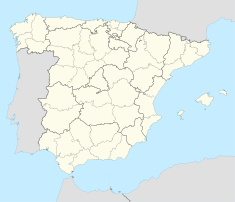Castle of San Sebastián (Cádiz)
| Castle of San Sebastián | |
|---|---|
| Native name Castillo de San Sebastián (Spanish) | |
 | |
| Location | Cádiz, Spain |
| Coordinates | 36°31′41″N 6°18′56″W / 36.528106°N 6.315614°W |
| Official name | Castillo de San Sebastián |
| Type | Non-movable |
| Criteria | Monument |
| Designated | 1993 |
| Reference no. | RI-51-0007575 |
The Castle of San Sebastián (Spanish: Castillo de San Sebastián) is a fortress located in Cádiz, Spain, at the end of La Caleta beach on a small island separated from the main city. It was declared Bien de Interés Cultural in 1993.[citation needed]
History
[edit]
According to the classical tradition of the location of the fortress, there was a Temple of Kronos, a Titan of the Greek gods, the father of Zeus, Poseidon, Hades, Hestia, Demeter and Hera.
In 1457, a chapel on the island was raised by a Venetian boat crew recovering from the plague.
In 1706, a castle was constructed, which resulted in a fortified enclosure of an irregular plane. It defended the northern flank of the city from attack. At the base of the lighthouse was a watchtower from the Muslim period.
In 1811, the Maltese navy arrived with the famous POW/rebel Junta of Buenos Aires, Juan Bautista Azopardo. He was housed in the fortress until 1815, when they suspected a leak and transferred him to the military prison in Ceuta.
In 1860, a levee was built to serve as a link between the island and the city.
The lighthouse has an iron structure designed by Rafael de la Cerda in 1908 and is the second electric-powered lighthouse in Spain. The tower rises to 41 meters above the sea.
The Castillo de San Sebastian was declared a cultural landmark in 1985.
References
[edit]

